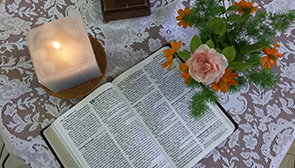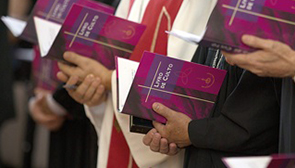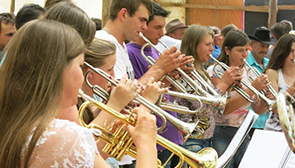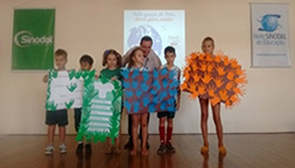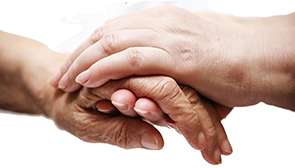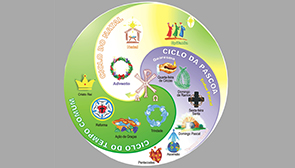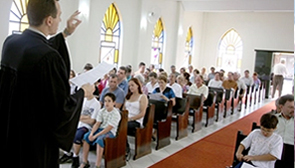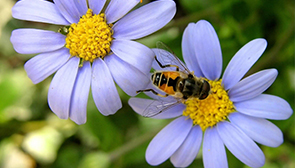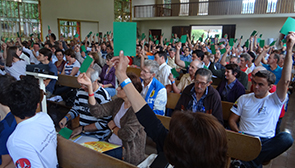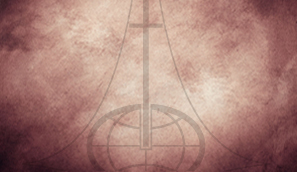Bible Study 26
Pastor: Juliana Alonso Pomposo
Seminario Luterano Augsburgo, del programa de “Con perspectiva de Género SEMLA.
Text
1 Chronicles 7:20-24
20 The descendants of Ephraim:
Shuthelah, Bered his son,
Tahath his son, Eleadah his son,
Tahath his son, 21 Zabad his son
and Shuthelah his son.
Ezer and Elead were killed by the native-born men of Gath, when they went down to seize their livestock. 22 Their father Ephraim mourned for them many days, and his relatives came to comfort him. 23 Then he made love to his wife again, and she became pregnant and gave birth to a son. He named him Beriah,[c] because there had been misfortune in his family. 24 His daughter was Sheerah, who built Lower and Upper Beth Horon as well as Uzzen Sheerah.
Approaching the text
The text tells the story of a family that lives at least three interesting moments. First, Ephraim's children steal cattle and for this action they are killed. Then, the family faces the loss of two boys, which in this context implied not only the loss of children, but the possible loss of property and honor.
After that, the process of sadness in which Ephraim submerges himself by not having children and thus, not having descendants. It is also mentioned that there are people accompanying him at this time, however, he is unable to overcome his pain, until he and his wife have another child whom they name Beriah, which means disgrace.
This son disgrace, has a daughter named Sheerah. A woman who is born into a family context that has been plagued by death, sadness and despair. But she also faces a patriarchal reality in which what one possesses (if one has anything at all) risks being lost because one has no male offspring, since the story does not tell us about male children, it only refers to the fact that Beriah has a daughter and with it the possibility of loss of property. However, the text turns around when it refers to the fact that Sheerah built three cities.
A feminine look
The text does not give more details about this woman's life, but looking to the hermeneutics of suspicion1, one can think that in such a patriarchal context and with such a complex family history, this woman had to make an effort to put aside all the prejudices that surrounded her (death, sadness, depression, hopelessness, and so on) to give way to a process of transformation that safeguarded her life, and that of many other people.
From this approach it can be said that Sheerah breaks with the patterns of her time, since it is notorious that she struggles so that her voice is heard, her work is recognized, and to develop her leadership in a context where men were the ones who exercised this type of activity.
It is also interesting to think about what Sheerah had to face at the family level, with the schemes she had to break in order to situate herself as a woman who managed to establish cities, who made her way through family disgraces and positioned herself as an autonomous, determined, hard-working, strategist, strong, resilient woman, a great leader.
Likewise, it is important to note that the three cities that this woman builds become strong communities for the people of Israel on more than one occasion, delivering death and giving victory to those who sought the welfare of families, particularly women and children2.
A look at our reality
Today, in the midst of situations as complex as violence, oppression, silencing, intimidation and minimization of women, it is interesting to be able to take up again the story of this woman who did not allow her family's past (death, depression, despair) and her own history (being a woman in a patriarchal context) to limit or stop her, rather she takes action to create spaces where disgrace is transformed into opportunity to improve the quality of life of other women and their families.
We can also observe a woman who, from the reality of the home-family, converts moments of pain and difficulty into the construction of safe spaces, of protection and growth for other women, girls and boys3. The capacity of resilience to which the text invites us to reflect is extremely hopeful in the moments of personal, family and social difficulties that women face in their daily lives.
The text also leads us to think about the ways in which we can build safe forts (spaces) for ourselves and other women, based on fraternal bonds of listening, empathy, solidarity, hope, and faith, where our experiences of pain, loss, and despair are motors of strength that embrace and accompany the processes of transformation and liberation for other women.
In a society where violence, aggression, and lack of empathy reign, there is the possibility of building sisterly communities, of encounter, where women can build together safe spaces for all.
Let's keep on dialoguing
How can my life experiences strengthen another woman's life?
What strengths (spaces) can we build from our experiences?
How can we work on our resilience in community?
Testimonies of personal, family and/or community transformation and liberation can be shared.
Notes:
1 Approach to the biblical texts, analyzing what the text says and what it does not say, that is to say, reading between the lines taking care of what the text hides, trying to look for the why and to find in them lines of liberation and equality.
2 1 of Maccabees 3: 13-24 Narrates the battle between Seron the commander of the army of Syria and his troops, facing Judas and a few men of the people of Israel. In this story it is emphasized that it is in the city of (low) Beth-Horon where the battle takes place, leaving Judas and his men as victors. One of the outstanding phrases is that Judas obtains the victory by his confidence in God and his sense of protection towards the women and children of the city.
3 It is considered that (high) Bet-horon constituted a strategic place before the possible invasions, while Bet-hor baja, was a place of commerce that strengthened the economy of the town.


